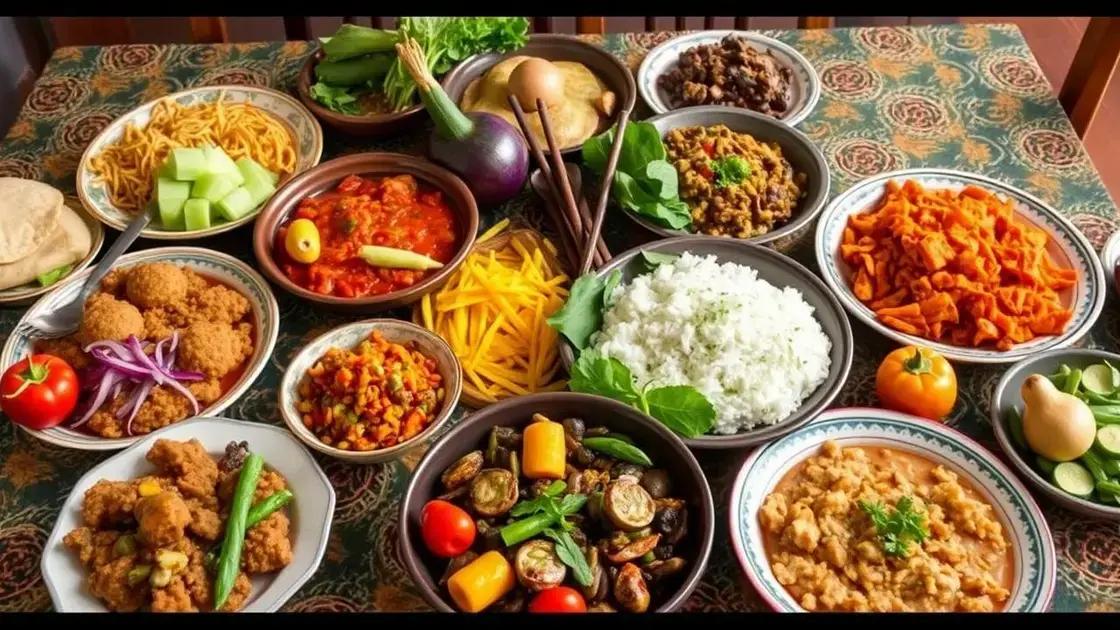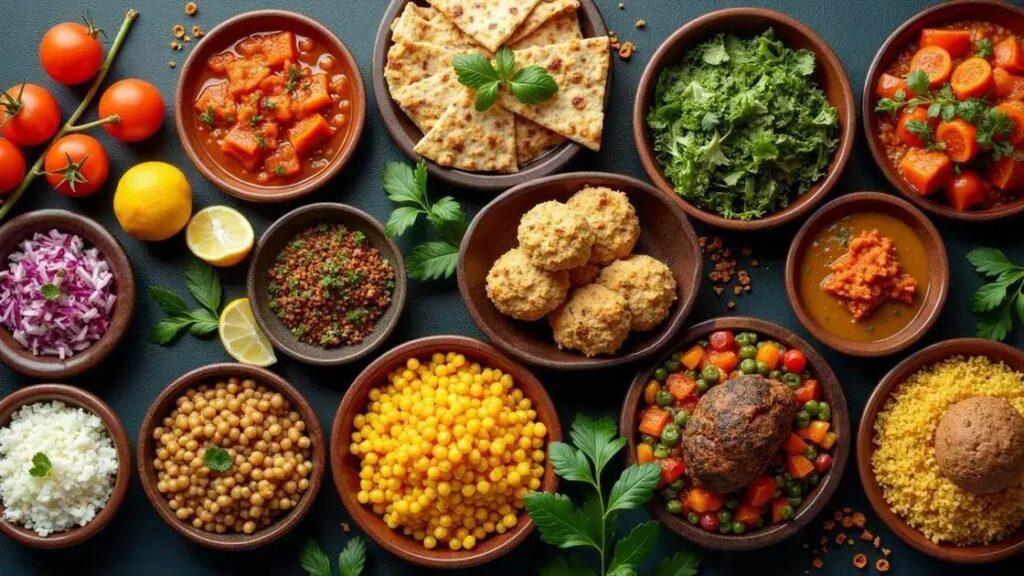Embracing African recipes not only introduces you to unique flavors and cultural diversity but also provides significant health benefits through nutrient-rich ingredients, balanced meals, and healthier cooking methods that boost overall well-being and foster community connections.
If you’ve been exploring the vibrant world of African recipes, you may wonder if they are making a positive impact on your health and cooking habits. African cuisine is not just about flavors; it’s a cultural journey that enriches your meals and overall well-being. In this article, we delve into the signs that indicate this culinary adventure is working for you, highlighting the importance of traditional African dishes in your daily diet.
Identifying the Right African Recipe

Choosing the right African recipe is essential for enjoying the rich flavors and cultural heritage this cuisine has to offer. To get started, consider the following tips:
Know Your Ingredients
Different African recipes call for unique ingredients. Understanding which ingredients are available and how to use them is key. For instance, dishes like Jollof rice require specific spices such as thyme and bay leaves, while others may focus on root vegetables or seasonal produce. Being familiar with these components will help you feel more confident in the kitchen.
Choose Based on Your Taste Preferences
Before diving into a recipe, think about what flavors excite you. Do you prefer spicy, savory, or sweet dishes? African recipes vary greatly, so explore options that match your palate. For example, a spicy Moroccan tagine or a sweet and nutty peanut stew can cater to different tastes and preferences.
Start Simple
If you are new to African cooking, begin with simpler recipes. Consider trying a basic African dish such as Chickpea Curry or Banku with grilled fish. These recipes offer great flavors without being overwhelming. Once comfortable, you can tackle more elaborate dishes.
Explore Various Regions
Africa is vast, with each region offering distinct culinary traditions. Explore recipes from West Africa, like Nigerian Egusi soup, East African dishes like Ugali, or North African favorites such as Couscous. This variety allows you to experience the continent’s diversity through its food.
Enjoy the Cooking Process
Finally, remember that cooking is an experience to be enjoyed. Embrace the process, experiment with flavors, and share your culinary creations with others. Making an African recipe is not just about the final dish, but the enjoyment of cooking and bringing people together.
Health Benefits of Embracing African Cuisine

Embracing African cuisine offers a variety of health benefits, making it a wonderful addition to your diet. Here are some of the key advantages:
Rich in Nutrients
African dishes often include a wide array of whole foods, such as grains, legumes, fruits, and vegetables. These ingredients are packed with essential vitamins, minerals, and fiber. For instance, dishes made with lentils or beans are high in protein and fiber, which support digestive health and muscle growth.
Promotes Balanced Diet
Many traditional African recipes focus on balance. They commonly pair starches with proteins and vegetables, which helps to create nutrient-dense meals. This practice encourages a balanced intake of carbohydrates, proteins, and healthy fats, contributing to overall health.
Boosts Immune System
Many African foods are rich in antioxidants and anti-inflammatory properties. Ingredients like ginger, garlic, and turmeric are found in many dishes. These ingredients help to strengthen the immune system and reduce the risk of chronic diseases.
Encourages Healthy Cooking Methods
African cuisine often uses cooking methods such as steaming, grilling, and slow-cooking, which preserve nutrients better than frying. This emphasis on healthier cooking methods contributes to better overall health and wellness.
Supports Mental Well-Being
Food brings people together, and enjoying African cuisine can enhance social connections. Sharing meals with family and friends can reduce stress and improve mood. The communal aspect of dining is a vital part of African culture and promotes mental well-being.
Explore the Wonders of African Recipes
In conclusion, embracing African recipes not only introduces you to a world of incredible flavors but also brings numerous health benefits. From nutrient-rich ingredients to balanced meals, the positive impacts on your health are undeniable. Experimenting with diverse recipes allows you to discover what works best for your taste and well-being.
As you incorporate these dishes into your cooking, you will notice how this cuisine can enhance your overall diet and lifestyle. Enjoy the process of cooking and sharing with others, as food is a powerful way to connect with culture and community.
Ultimately, recognizing the signs that African recipes are transforming your culinary experience will inspire you to continue this delicious journey.
FAQ – Frequently Asked Questions about African Recipes
What are the health benefits of African cuisine?
African cuisine is rich in nutrients, promotes a balanced diet, and includes ingredients that boost the immune system and overall health.
How do I identify the right African recipe for me?
Consider your taste preferences, ingredient availability, and start with simpler recipes to build confidence in cooking African dishes.
Can I explore different regional dishes?
Absolutely! African cuisine varies by region, so you can enjoy a diverse array of dishes from different cultures within the continent.
What cooking methods are common in African recipes?
Common methods include steaming, grilling, and slow-cooking, which help preserve the nutrients in food and promote healthier eating.
How can cooking African cuisine enhance social connections?
Sharing meals made from African recipes strengthens bonds among family and friends, as food is a central part of community and culture.













